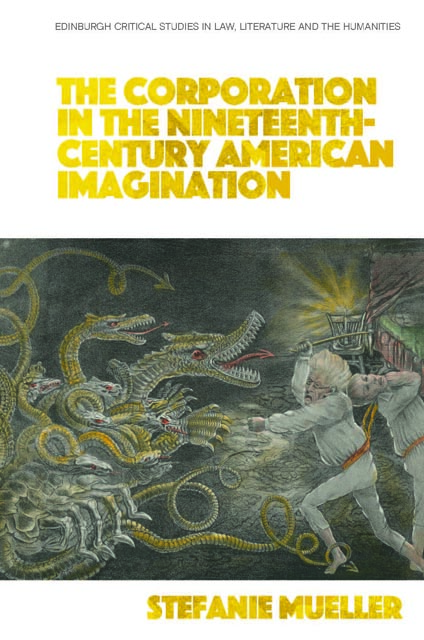Book contents
- Frontmatter
- Contents
- List of Figures
- Acknowledgments
- Introduction: The Many and the One: Corporate Bodies and the Body Politic in US Law and Culture
- 1 Narrating Monopoly and Empire: Austin, Irving, and the Charles River Bridge Case
- 2 The Soulless Corporation: Cooper and the Decline of the Republic
- 3 Satanic Corporate Agents in the Marketplace: Hawthorne, Melville, De Forest, and the Uses of Allegory
- 4 Incorporating the Nation: Ruiz de Burton and “Quasi Public” Corporations
- 5 The End of Individualism: Tarbell, Norris, and the Power of Combinations
- Conclusion: Frankenstein in a Gray Flannel Suit
- Bibliography
- Index
Conclusion: Frankenstein in a Gray Flannel Suit
Published online by Cambridge University Press: 25 April 2023
- Frontmatter
- Contents
- List of Figures
- Acknowledgments
- Introduction: The Many and the One: Corporate Bodies and the Body Politic in US Law and Culture
- 1 Narrating Monopoly and Empire: Austin, Irving, and the Charles River Bridge Case
- 2 The Soulless Corporation: Cooper and the Decline of the Republic
- 3 Satanic Corporate Agents in the Marketplace: Hawthorne, Melville, De Forest, and the Uses of Allegory
- 4 Incorporating the Nation: Ruiz de Burton and “Quasi Public” Corporations
- 5 The End of Individualism: Tarbell, Norris, and the Power of Combinations
- Conclusion: Frankenstein in a Gray Flannel Suit
- Bibliography
- Index
Summary
A corporation is an artificial being, invisible, intangible, and existing only in contemplation of law. (Dartmouth v. Woodward, 1819)
Such is the Frankenstein monster which States have created by their corporation laws. (Liggett Co. v. Lee, 1933)
In early 1933, a case about Florida chain stores reached the US Supreme Court and prompted Justice Louis D. Brandeis to write a particularly literary condemnation of corporations. The case, which had reached the Court on appeal, concerned a Florida statute requiring the owners of chain stores to pay higher licensing fees. The details were complex, including not just the Equal Protection and Due Process Clause of the Fourteenth Amendment, but also the Commerce Clause of the Constitution. But the bottom line was that the state of Florida was exacting higher fees from single owners—whether corporations or natural persons—that were operating multiple stores across county lines, as opposed to individually owned and operated small stores or cooperatives. More than a dozen corporations, incorporated in Florida as well as in other states, had sued and demanded equal treatment as persons within the meaning of the Fourteenth Amendment—to which, as the Court agreed, they were principally entitled: “Corporations are as much entitled to the equal protection of the laws guaranteed by the Fourteenth Amendment as are natural persons” (Liggett Co. v. Lee 536). The natural entity theory and the so-called fiction theory of corporate personhood had been more or less accepted by the Court since at least Southern Railway Co. v. Greene (1909), though it had not replaced the older models. While the Court ultimately did not find a violation of the Fourteenth Amendment, it did hold certain provisions in the statute “unreasonable” and returned the case to Florida for a new trial.
In Justice Brandeis’s opinion, not only had the Court missed the point of the statute but there was another, more pressing reason why the statute should be sustained: the fact that the Court was no longer dealing with a rich individual owning many stores, as opposed to a less well-off individual owning only one, as had been the case in the past. Instead, he pointed out, “[the] plaintiffs [in this case] are all corporations” (Liggett Co. v. Lee 543). The point of “Anti-Chain Store Laws,” Brandeis explained, “is to protect the individual, independently-owned, retail stores from the competition of the chain stores” (Liggett Co. v. Lee 541).
- Type
- Chapter
- Information
- The Corporation in the Nineteenth-Century American Imagination , pp. 191 - 196Publisher: Edinburgh University PressPrint publication year: 2022

